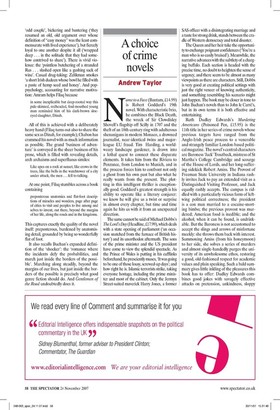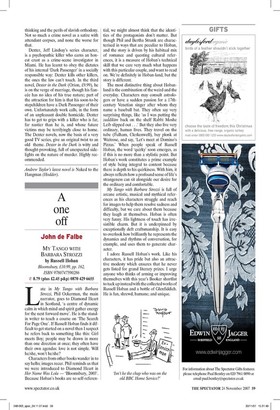A choice of crime novels
Andrew Taylor Name to a Face (Bantam, £14.99) is Robert Goddard's 19th novel. With characteristic brio, he combines the Black Death, the wreck of Sir Clowdisley Shovell's flagship off Scilly in 1707 and the theft of an 18th-century ring with adulterous shenanigans in modern Monaco, a drowned journalist, near-identical twins and majorleague EU fraud. Tim Harding, a worldweary landscape gardener, is drawn into a lethal quest to connect these disparate elements. It takes him from the Riviera to Penzance, from London to Munich, and in the process forces him to confront not only a ghost from his own past but also what he really wants from the present. The plotting in this intelligent thriller is exceptionally good. Goddard's greatest strength is his ability to operate like a literary conjurer: we know he will give us a twist or surprise in almost every chapter, but time and time again he hits us with it from an unexpected direction.
The same cannot be said of Michael Dobbs's The Lord's Day (Headline, £17.99), which deals with a state opening of parliament (an occasion snatched from the furnace of British history') and its unorthodox aftermath. The sons of the prime minister and the US president have come to view the splendid spectacle. As the Prince of Wales is putting in his cufflinks beforehand, he presciently muses, 'It was going to be one of those lousy, screwed-up days'; and how right he is. Islamic terrorists strike, taking everyone hostage, including the prime minister and most of the cabinet. Only the Jermyn Street-suited maverick Harry Jones, a former SAS officer with a disintegrating marriage and a taste for strong drink, stands between the cradle of Western democracy and total disaster.
The Queen and her heir take the opportunity to exchange poignant confidences (You're a man who is so easily bruised). Meanwhile, the narrative advances with the subtlety of a charging buffalo. Each section is headed with the precise time, no doubt to heighten the sense of urgency, and there seem to be almost as many viewpoints as there are characters. Still, Dobbs is very good at creating political settings with just the right veneer of knowing authenticity, and something resembling his scenario might just happen. The book may be closer in tone to John Buchan's novels than to John le Cane's, but in its own terms it is both effective and entertaining.
Ruth Dudley Edwards's Murdering Americans (Poisoned Pen, £15.95) is the 11th title in her series of crime novels whose previous targets have ranged from the Anglo-Irish peace process to a venerable and strangely familiar London-based political magazine. The novel's central characters are Baroness 'Jack' Troutbeck, mistress of St Martha's College Cambridge and scourge of the House of Lords, and her long-suffering sidekick Robert Amiss. The Provost of Freeman State University in Indiana rashly invites Jack to pay an extended visit as a Distinguished Visiting Professor, and Jack equally rashly accepts. The campus is riddled with a particularly vicious form of leftwing political correctness; the president is a con man married to a cocaine-snorting bimbo; the previous provost was murdered; American food is inedible; and the alcohol, when it can be found, is undrinkable. But the Baroness is not accustomed to accept the slings and arrows of misfortune meekly: she throws them back with interest. Summoning Amiss (from his honeymoon) to her side, she solves a series of murders and almost single-handedly purges the university of its unwholesome ethos, restoring a good, old-fashioned respect for academic values and plain speaking. Such a bald summary gives little inkling of the pleasures this book has to offer: Dudley Edwards combines good jokes with savagely effective attacks on pretension, unkindness, sloppy thinking and the perils of slavish orthodoxy. Not so much a crime novel as a satire with attendant corpses, and none the worse for that.
Dexter, Jeff Lindsay's series character, is a psychopathic killer who earns an honest crust as a crime-scene investigator in Miami. He has learnt to obey the dictates of his internal 'Dark Passenger' in a socially responsible way: Dexter kills other killers, the ones the law can't touch. In the third novel, Dexter in the Dark (Orion, £9.99), he is on the verge of marriage, though his fiancée has no idea of his true nature; part of the attraction for him is that his soon-to-be stepchildren have a Dark Passenger of their own. Unfortunately work calls, in the form of an unpleasant double homicide. Dexter has to get to grips with a killer who is far, far nastier than he is, and whose future victims may be terrifyingly close to home. The Dexter novels, now the basis of a very good TV series, give an original twist to an old theme. Dexter in the Dark is witty and thought-provoking, full of unexpected sidelights on the nature of murder. Highly recommended.
Andrew Taylor's latest novel is Naked to the Hangman (Hodder).







































































 Previous page
Previous page